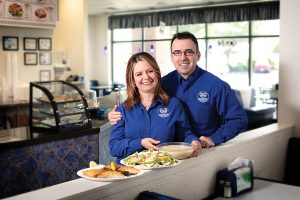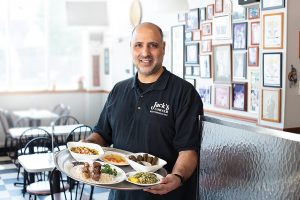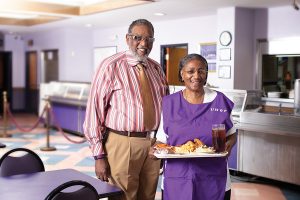
Soup’s On!
Mythos Grill’s cure for whatever ails you
By Cynthia Adams
Photograph by Mark Wagoner
Even the pernicketybadboy chef Anthony Bourdain ’fesses up to hoovering down mac and cheese when he’s in want of comfort. But not me. Whenever I’m puny, feverish, chilled, stressed, cranky, gassy or sniffly — the seven dwarves of bleccch — I know the cure.
I need avgolemono, aka Greek penicillin.
Pronounced Ahv-yo-Lemon-o with a silent g, it translates simply into egg and lemon. Mythos Grill (Taste of Greece: Fresh, Healthy, Delicious is their mantra) starts the stock, which is the basis of this classic Greek dish, every morning and afternoon except Sunday, when the restaurant is closed.
Into the pot go simple ingredients (chicken, broth, egg, lemon, rice) that are stirred, simmered and stewed into creamy subtlety. It is more than the sum of its parts.

As the spoon nears my mouth, a rich, meaty bouquet greets my nose. And on the palate, don’t look for fireworks: It’s comfort food incarnate, as only chicken soup can be — silky and round, with just a hint of sour from the lemon and richness from the egg. The rice gives it a creamy texture. As it heads toward my stomach, my pulse slows, sinuses open, headache eases and eyes clear. (I check my compact mirror, and by God, I even look better.) Healing by avgolemono has begun.
“It has a fan club,” admits Mythos owner Eddie Balla. Eddie and his wife, Miranda Balla, run the Market Street location and sell their soup by cup, bowl, or quart, made by the gallons, rain or shine, cold days or hot.
How did Eddie master the perfect consistency of his avgolemono? He had years of practice, having worked in Athens, Greece, at age 20. When he opened Mythos Grill in 2005, Eddie called it “Greek fast-food, but cooked to order and fresh.”
Another family member, Samir, runs the Mythos Battleground location. Samir says the soup at both grills is made faithfully from Eddie Balla’s recipe.
Eddie says modestly, “It’s a very famous Greek soup — I didn’t invent it.”
As much as 20 gallons are sold between the two restaurants six days a week. After a cold spring, the soup-making — and — sales continued into late April although production dropped–to about 6 gallons made twice daily at Market Street alone. During the summer months, the Ballases discovered they sold less, yet a steady customer demand continued.
The classic dish has origins in Mediterranean sauces and soups created with egg yolk and lemon. “You can make it with orzo or rice,” Eddie explains. “In the northern part of Greece where I am from, we use rice . . . We make the broth out of chicken, which we use later.”
Eddie adds rice to the broth near the end of the preparations. “At that point, we add the chicken in it, and on the side, we have the egg ready. We only use the yolks; you can use the egg white, but we don’t.”
He whips egg yolk with lemon juice in a separate dish, while in another, he mixes butter and a small quantity of flour, which is added to the simmering rice and broth at the end.
Before that final step, Eddie extracts a bit of broth, which is whisked into the frothed egg and lemon juice. This goes into the pot about five minutes as the soup is thickening during the final minute of cooking.
“The time when we add that is very important,” Eddie cautions. “If you put it in too late, it won’t give the smoothness of it. Too early . . .” he frowns.
“You must put it in the right time for the creamy texture!”
“We were keeping it only for wintertime, but a lot of people ask for it,” says Eddie. “We’re not going to give up on it if it makes customers happy.” Patting his slender waist, he adds, “For some reason, when you have an upset stomach, it is soothing. It is a comfort food.”
The House that Jack Built
Jack’s Corner is a hub for Mediterranean food and good conversation
By Ross Howell Jr.
Photograph by Mark Wagoner
At the intersection of South Aycock and Spring Garden streets — in the shadow of the water tower painted with the brawny UNCG Spartan — stands Jack’s Corner, a Mediterranean deli that’s been serving Mediterranean fare located here for 26 years. The building has a curved façade and big windows — reminiscent of 1960s roadside diners.
Inside I’m greeted by Jacob (Jack) Bishara, a tall man as strong-jawed as the Spartan on the water tower. His face breaks into an easy, broad smile as we sit at a table.
“I was the family’s baby boy,” Bishara says. “I was a little spoiled, you know? When I was about 16, I said to Mom and Dad, ‘I have no interest in going to college.’”
His parents asked what he thought he would do to earn a living. He didn’t have an answer.
So the Bisharas set out on a family trip, first to Michigan, then to Texas. Bishara had uncles in the restaurant business at both places.
“They said to my Dad, ‘Don’t you own property right by the college? Why don’t you open a restaurant?’”

But neither Bishara nor his parents had any experience.
His grandfather, James Bishara, came to the states from Ramallah, Palestine, in 1934. During the Depression, he’d made a living selling linens door-to-door. When he returned to Ramallah for a visit, he convinced his son, Essa — Jack’s father — to emigrate in 1956.
Essa settled in Tennessee and worked in real estate. When he returned to Ramallah for a visit, he noticed an attractive young woman at a party thrown by two brothers who were his boyhood friends.
“Why, that’s little Najwah!” the brothers exclaimed. The attractive young woman was their sister, whom Essa hadn’t seen since she was a girl.
In time they were married. Najwah came to the United States with Essa in 1962.
“Mom and Dad were living in Knoxville,” Bishara says, “when they drove to Greensboro to visit her two brothers.”
His father was struck with how beautiful the city was, and decided Greensboro was the place to raise a family.
“So they moved here,” Bishara says. “This is where I was born.”
Since his mother had grown up in Ramallah helping cook for a family of 10, she had recipes for Mediterranean dishes going back generations. Bishara’s father thought she was the obvious partner for his son’s venture.
Bishara pauses, gazing at a wall of framed photos. There are mustachioed men with fezzes and women in flowing dresses gathered with their children. There’s Najwah in her gown and Essa in a suit on their wedding day. There’s a bearded priest in the robes of the Antiochian Orthodox Christian Church — Najwah’s grandfather, who married the couple.
“One day my Mom and I were talking business,” Bishara continues, “and she looked at me and said, ‘I think we can do this.’”
And they did. In what had been a curb market catering to college students, Bishara and his mother opened a sandwich shop — with hamburgers, subs, hot dogs, potato chips, and so on.
“We thought it best to stay mainstream,” he says. “But we also had hummus on the menu. Falafel. And tabbouleh.” But this was 1992, and there wasn’t a lot of talk in Greensboro about healthy ethnic foods at the time.
The first couple of years were “a real struggle,” Bishara says.
Then something happened.
Grunge music — in the person of Kurt Cobain and Nirvana — exploded on the popular scene.
“All of a sudden,” Bishara says, “these young people were coming in, looking for vegetarian food.”
So Bishara expanded the Mediterranean portion of the menu — easy to do, with all his mother’s home recipes. Today, ethnic specialties comprise 85 percent of the items on the menu.
Some customer go-tos?
“The Mediterranean platter — with falafel, hummus, tabbouleh, pita, and baba ghanouj,” Bishara says. “And the double gyro platter—that’s always popular.”
Other favorites are the chicken kabob platter, the lamb shawarma, the chicken souvlaki and gyros. With a nod to its early days, the deli offers a falafel dog and a falafel burger. I haven’t even mentioned the sandwiches, salads and children’s menu.
When I ask about the future, Bishara tells me he and his wife have three children — aged 17, 16, and 12.
“When the kids were little, I’d bring them into work with me,” Bishara says. “They really liked hanging out. But my wife — because she knew how much time the restaurant took — would say, ‘Jack, you don’t want them to love it too much.’”
None of the children are interested in the business now, Bishara tells me.
Then he smiles.
“But they’re young,” he says. “Who knows what will happen?”
The Soul of Fellowship
United House of Prayer For All People serves a heaping helping of love, seven days a week
By Jim Dodson
Photograph by Mark Wagoner
For better than 75 years, as part of its social outreach ministry, the United House of Prayer For All People has served great home-cooked food to those in need or those simply with a hearty appetite starting first on East Market Street and these days, at the cafeteria in the basement of its handsome Dudley Street sanctuary.
Long regarded as one of the best-kept secrets in Greensboro’s crowded dining scene, we checked in with a noontime crowd and discovered the church is still dishing up the best in classic soul food — Southern fried chicken, smothered pork chops, deep-fried fish on Fridays and weekly specials sided with soulful staples that include savory seasoned collards, slow-cooked green beans, home-style mac and cheese and always a generous piece of cornbread. Wednesday is baked spaghetti and Thursday is the church’s much-anticipated and famous meatloaf day. If you’re lucky, most any day you can sit down to chicken and dumplings, and there’s always at least a couple kinds of cake that will make you miss church picnics.

Every dish is fresh and made from scratch by the loving hands by three principal cooks and a staff of half a dozen workers who volunteer their time and talents to the church’s community outreach. A typical lunch (after which you may need a nap) runs less than $10.
“The cornerstone of our success is our volunteers,” says senior pastor Hubert Swaringer. He emphasizes that one of the prime missions of the church’s nondenominational parishes nationwide (there are more than 135, including sister churches in Charlotte and Durham), is to operate a kitchen — open to anyone and everyone — “fresh, wholesome food at a reasonable price they can afford. Our founder’s philosophy was that if you feed a hungry man, you can also feed his soul.”
Students from neighboring N.C. A&T State University, just across the street, are frequent diners during the school year, and so are soul-food fanatics who happen to know about the kitchen through word of mouth. Every penny the cafeteria generates goes into the budget of the church, but nary a penny is spent on advertising.
“We do a pretty good job with word of mouth,” notes kitchen coordinator Denise Gray. “We cook it with love, they hear about it and come.”
When the tornado ripped through east Greensboro in April, the cafeteria provided meals to many victims and emergency workers and recently held a marathon fish fry to generate money for its scholarship fund to help A&T students.
“I worked at A&T for 32 years and retired in 2012,” Denise Gray adds. “I came over here to help out and have been here almost every day since. The people here love cooking and serving others. That’s what serving the Lord is all about.”
A perfect description of Soul Food, we think.
Pizza as it Should Be
Family-style is the hallmark of Cugino Forno
One might easily forgive loyal patrons of Cugino Forno pizzeria in Revolution Mill for assuming its owners Joseph Ozbey and Yilmaz Guver are Italian brothers who happen to make the closest thing to authentic Neapolitan pizza.
In fact, they are Turkish cousins (as is their third partner Adam Aksoy) who fell in love with the simple cheese pizza served at iconic L’Antica Pizzeria da Michele in Naples and brought the recipe and know-how for the “world’s greatest pizza” with them to America. After all, by some accounts this internationally beloved foodstuff was birthed in Naples when fishermen began dousing day-old bread with tomato sauce and layering on the cheese.

The pizza know-how was supplied by Joseph, an engaging 26-year-old who, following college at Georgia Tech and traveling extensively through Europe, wrangled a job mopping floors at the famous Naples pizzeria “just to learn everything I could about how to make their amazing pizza.”
Progressing from mop to pizza-prep took more than eight months of hard work that included plenty of 5 a.m. mornings and late nights. “They make pizza in a very Old World way,” says Joseph. “I watched and learned every aspect of how they did it and got to know the guys there. We remain friends to this day. We’ve incorporated everything they do here; down to the smallest detail.”
That includes the three massive Italian-made 7,000-pound wood-fired ovens made from Mount Vesuvius sand and shipped to the Port of Wilmington via freighter just before the restaurant opened its doors just over a year ago. “They barely fit through the doors,” Joseph says, laughing at the memory of the tight squeeze.
With an equal mix of hickory and oak, the mighty ovens produce upwards of 1,000-degree heat that can cook a pizza in less than 90 seconds, but the real secret of their Old World taste is the double-ought (“00”), extra-fine pizza flour imported directly from Naples, same San Marzano tomato sauce and a delicious double Bufala Mozzarella that “was in Naples yesterday.”
Flour, sea salt, yeast and a bottled water constitute the simple family recipe that makes Cugino Forono — the name means “ovens of cousins” — pizza so beguilingly different. Following a search that took Joseph on a two-month car odyssey around the state, the cousins learned about a great open space at Revolution Mill and soon knew they’d found home. They outfitted the airy space with large communal tables to encourage conversation, developed a menu with a dozen authentic variations of the famous original, fired up the ovens and started making genuine Napoli pizza. Robust and imaginative salads, real Italian wines, fresh cannoli and a state-of-the-art rotating gelato cooler — made by Ferrari, no less — filled with gelato that arrives from the Old Country almost daily completes the simple but spectacular offerings. Italian flags and European soccer jerseys hang everywhere and a special “Spice Bar” allows customers to jazz up their pizza, if so desired. Puccini’s opera arias, or the familiar theme to The Godfather, play in the background.
The topping on the cousins’ pizza may be the warm reception they have found with the Gate City diners. “Authenticity to the smallest detail is our key,” says Joseph. “But quite honestly, we weren’t at all certain this kind of simple pizza would go over well in America. The community, however, has embraced our home-style approach to pizza. We have customers who come every week to dine with other families, couples and children, old and young, people enjoying the experience of being together.”
Great pizza, he says, will do that. “It’s been a great journey for us to come so far and find a home in Greensboro. We hope to be serving families for a very long time.”





